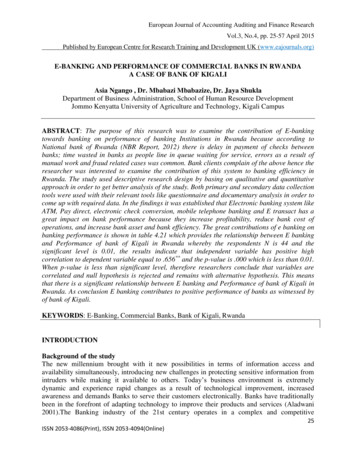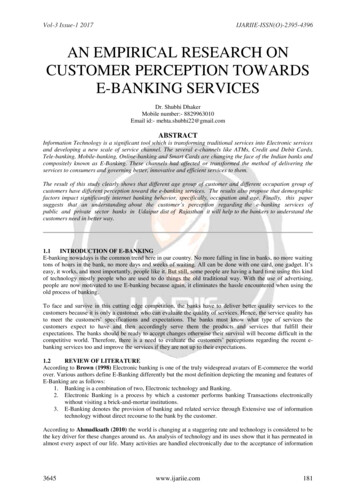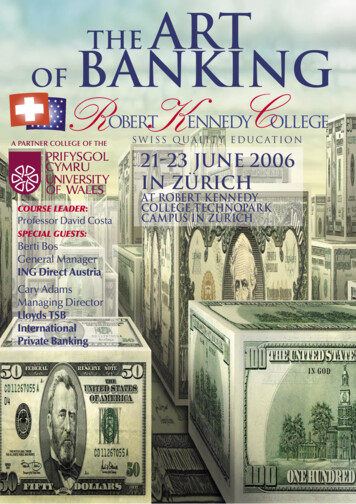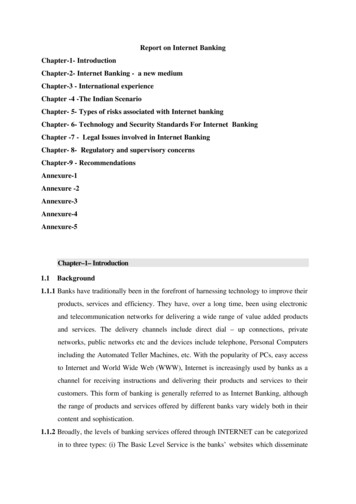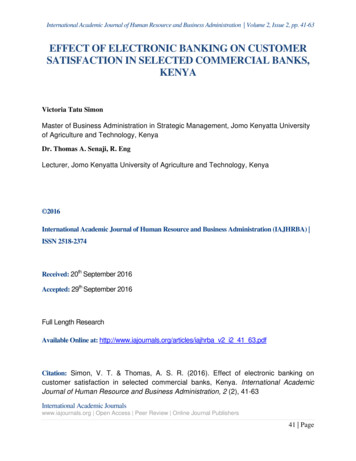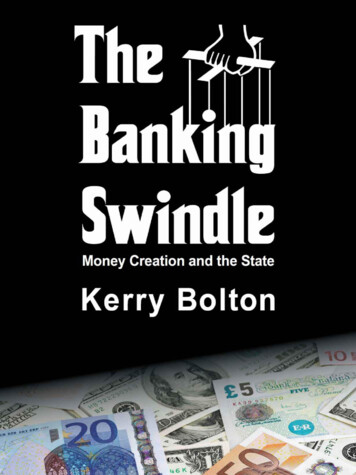
Transcription
The Banking SwindleMoney Creation and the StatebyKerry Bolton
The Banking SwindleMoney Creation and the StatebyKerry BoltonCopyright 2013 Black House Publishing LtdAll rights reserved. No part of this book may bereproduced in any form by any electronic ormechanical means including photocopying,recording, or information storage and retrievalwithout permission in writing from the publisher.Black House Publishing LtdKemp House152 City Road
LondonUNITED KINGDOMEC1V 2NXwww.blackhousepublishing.co.ukEmail: info@blackhousepublishing.co.uk
The study of money, above all other fields ineconomics, is one in which complexity is used todisguise truth or to evade truth, not to reveal it.The process by which banks create money is sosimple the mind is repelled. With something soimportant, a deeper mystery seems only decent. Dr John Kenneth Galbraith, American Economistand Presidential Adviser, Money: Whence itcame, where it went (1975)
Table of ContentsForeword IForeword IIForeword IIIIntroductionThe Empire of MammonWhat is ‘The City’?From Holland to EnglandRothschilds: Lords of International FinanceWar Against NapoleonThe British Empire & Cecil RhodesThe Global Debt-Finance SystemBreaking the Bondage of InterestWhere is the Right?Movements for Banking ReformGreen Shirts of EnglandNew Zealand LegionMosley’s FascismA B TheoremEzra Pound On EconomicsFather Coughlin & Social JusticePilgrims of Saint Michael
Catholic Church Condemned UsuryStates that Broke the Bondage of UsuryGuernseyThe WäraWoerglLincoln and KennedyCommonwealth Bank Of AustraliaNew ZealandJohn A LeeState HousingCanadaGermanyJapanFascist ItalyMuslim BankingConclusionPlaying Cards Saved QuebecA Successful Gamble‘Graybacks’ & the ConfederacyWas the Confederacy a Rothschild Tool?Judah P Benjamin: Davis’ ‘Court Jew’?Diplomatic Failures With Europe
Loans Not ForthcomingCzar Nicholas Sacrificed to the Golden CalfAnti-Czarist Agitation From USABankers Welcomed Czar’s OverthrowCzarist Economic PoliciesRuskombankThe Real Right’s Answer To Socialism &CapitalismRightist Programme Against UsuryBeyond The Economic TreadmillCommon Outlook Of Marxism & CapitalismCapitalism in Marxist DialecticsUniformity of Production & CultureReactionismHomo OeconomicusConclusionAbout the Author
Foreword IThere are movements around the world thatattempt to combine the thinking of manyindividuals and movements that have attemptedto free peoples and nations from ‘the thrall ofinterest slavery’. What has been missing, untilthe appearance of Dr. Bolton’s book, is a singlework that brings together all of them.Kerry Bolton has constructed an instrument toteach mankind to understand the system of debtslavery and that system’s false rationale. This isthe book you hold in your hand. It is weapon toslay a tyranny who has almost limitless power tocontrol - through the private monopoly of moneyand credit - almost every aspect of the life of theindividual and society.When I received a copy of a draft of Dr.Bolton’s book I was at once impressed at how hewas presenting facts in those areas in which I
fancy myself an expert with perfect accuracy buteverywhere taking things beyond what I had seen- such as the Confederate States of America(1861-1865) ‘greyback’ currency and the trulyrebel financial system of the Confederacy - thisis just one. There are dozens of such revelationsin this book - that I found both earth shaking andhumbling.I found in The Banking Swindle a potentialinstrument of deliverance, a history and analysisso comprehensive that I have no doubt that it canpresent the current situation so thoroughly,briefly and clearly as to open the eyes and breakthe mental chains of anyone who reads it. Ibelieve that if this book were read widely theintellectual grip of the Money Power would bebroken. There is no other book of which I can saythis. I can also say that the best teachings of themany Social Credit, populist, anti-usury, antiRothschild etc., all converge in this book. Regardit as sacred. I did after reading the first twosections. It was an answer to my prayers. May it
be the answer to yours.
May we all come away from this book withone determined mind on what must be done withthe system that enslaves mankind in debt.Dick Eastman,Yakima, WashingtonDick Eastman is a leading Social Credit advocate in the USA,has taught micro- and macro- economics, money and bankingat Heritage College, Washington, and is founder of the CitizensAmerica Party, www.citizensamericaparty.org/socialcredit.htm
Foreword IILord Acton left us with two famous quotesthat basically sum up the human predicament: Hefirst warns us that ‘power tends to corrupt andabsolute power corrupts absolutely’. Later, hesaid: ‘The issue which has swept down thecenturies and which will have to be fought sooneror later is the people versus the banks’.The centralization of power in ever fewerhands at ever higher levels is a clear trend inmodern history. Especially since the SecondWorld War Supra-National Governance hasescalated remarkably. Closer scrutiny undeniablyshows that financial interests are behind thistrend.Recently, a publication in New Scientistproved that all the major banks in fact own eachother and that they are operating as one massiveinternational cartel.This is the Empire of Mammon, the MoneyPower. It has haunted Humanity ever since the
beginning of time and it was Jesus’ maintemporal enemy. In fact: it is the physicalmanifestation of the Evil One’s rule in the Earthlydomain. Its main tool is its control of the moneysupplies of the nations, which it owns as amonopoly and which it uses to maximize profitsthrough Usury and the Boom/Bust Cycle:alternating inflation and deflation.Usury is the ultimate centralizer of power.The poorest 80% of the world pay more interestthan they receive to the richest 10% (MargritKennedy/Helmut Creutz). The total global wealthtransfer amounts to anywhere between 5 to 10trillion dollars per year. Worse: millionaires paymore interest than they receive to billionaires andthe billionaires are interest slaves to thetrillionaires. Yes, we have trillionaires on theplanet.What this means, is that all the interest that ispaid in the entire world ultimately ends up withthe very richest at the absolute top of the foodchain. This has been dubbed Usurious Usurpation.
It is the awareness of this foe and its mainweapon, Usury, that motivates us to organizemonetary reform; both at the Government leveland through non-usurious local and regionalcurrencies, like the Gelre.Kerry Bolton tracks back the Money Power toancient times and explores how it re-enteredEurope via the Dutch Republic and the nascentBritish Empire. He describes in no uncertainterms how the Money Power was behind many ofthe conflicts we mistakenly assume were purelybetween competing Nation States. He rewritesWestern History as an ongoing struggle againstMammon’s Empire.The Banking Swindle is well researched andfast paced and analyzes both the political andmonetary realities of the last few centuries. Dr.Bolton’s research of the many different proposalsfor monetary reform in different parts of theworld throughout the ages, providing a muchwelcome comparative history, is exemplary. Hisanalysis of the Marxist-Capitalist Dialectic is
indispensable.The Banking Swindle is a highlyrecommended primer for all those awakening tothe political realities mainstream media andscience desperately try to ignore. Most useful formonetary reformists looking to get a better graspof the available proposals. A most welcome effortin a struggle that is close to its climax.Anthony MigchelsAnthony Migchels is an Interest-Free Currency activist andfounder of the Gelre, the first Regional Currency in theNetherlands. His articles on Usury, Money Power andMonetary Reform have been syndicated on most of the leadingoutlets of the Alternative Media and can be found at :www.realcurrencies.wordpress.com
Foreword III“History is bunk” is a cliché with which we are allfamiliar. Having studied usury and fractionalreserve banking intently and knowing who wasbehind it all, when Henry Ford uttered thosefamous words in 1916, what he really meant tosay is that history is untrustworthy. The secondfactor is that history is full of omissions, whichEzra Pound warned students of the University ofWisconsin in a paper he wrote for them in thespring of 1935. Finally, about 20 years ago adecision was taken by the powers that be toabolish the teaching of economic history in thecommerce faculties and business schools of mostof the universities around the world.Economic history has thus been consigned to theOrwellian “memory hole” together with all thoseflourishing and viable monetary systems of thepast. The knowledge (sic) has been fixed, at leastin the minds of the arrogant and ignorant centralbankers, and only one system is tolerated,
orthodox finance; viz. that, with the exception ofbank notes and coin, the creation of the means ofexchange as an interest bearing debt, may only beundertaken by privately owned banks for theirexclusive benefit.The exponential rate at which both public andprivate debt plus interest is compounding andaccelerating is unsustainable, particularly as theunderlying populations bearing this increasingburden in North America, Europe, China andJapan are shrinking. One can only assume thatthese insane financial policies are by design andthat when the international banking systemcrashes, it will be replaced by a World ReserveBank and the subsequent universal enslavementof mankind.This admirable volume serves not only to fillthese gaps in our history, which have beendeliberately created, but to remind us of theglories and successes of the past, and to give hopeand sustenance for the abundance and prosperity,which all of us can share in the future.
Stephen Goodson: Director South AfricanReserve Bank (2003-2012)
IntroductionIn the midst of the global debt crisis, withriots, bombings, default, and failed policiesproposed from all sides of politics, the world isfloundering about with less understanding of theproblems and possible solutions than our ‘lesseducated’ parents and grand parents during theGreat Depression. The scribbling and chatteringclasses have hardly helped; indeed they haveobfuscated the character of economics andfinance, and one might be tempted to concludethat is the job of many of them.Eighty to ninety years ago our parents andgrandparents understood what was needed inregard to the problems that descended upon themfrom ‘above’. As the iconic New Zealand Labourpolitician John A Lee remarked in his pamphletsof the time, the problems of banking and the needfor reform were understood and debatedthroughout the population, in pubs, on buses, atwork The people did not need a tertiary
education in economics to understand what waswrong. People such as Lee and the New Zealandbusinessman and magazine proprietor HenryKelliher explained the situation in the simpleterms that are more sufficient than theexplanations provided today by economists, withjargon that means nothing in real terms. Thenationalisation of the New Zealand Reserve Bank,and the necessity of issuing state credit was themain platform that brought the First New ZealandLabour Government to Office in 1935. TheGovernment dealt with the Depression not byoutmoded socialist theories from the 19th century,but by intervening in the key area of banking. Theimpetus for this had not come from Marxists, whoopposed Lee’s efforts, but from the burgeoningSocial Credit movement that had emerged overthe British Dominions. Banking reform had beenpromulgated successfully by two men of the‘Right’, the above named Kelliher, and the thenwell known banking reformer A N Field, whosebooks, such as The Truth About the Slump,
became best-sellers in 1930s New Zealand. Thesame year, (1935) Social Credit assumed Officein Alberta, Canada.Throughout the Western world, in theaftermath of World War I, a decade prior to theGreat Depression, there was widespread demandfor banking reform. This demand was more likelyto come from the Right than from the moribundLeft, which could not think much beyond taxationand nationalisation (like the present ‘OccupyMovement’ in response to the current debt crisis).Indeed, in Germany, that nation’s leading bankingreformer, Gottfried Feder, attempted to interestthe short-lived Soviet Republic in Bavaria in hisplans for banking reform, only to be rebuffed, butfinding a ready audience in the embryonicGerman Workers’ Party, which fifteen years laterpartially implemented the Feder plan and setGermany on the course to recovery amidst worldDepression.Now the whole parasitic debt finance systemtotters and falls like a house of cards, as the greed
of bad investments based on usury captures upwith the money-lenders. In the USA, Ireland andSpain the crisis was precipitated by mortgagelending, which could not be sustained. Thecommon folk in indebting themselves while notreceiving sufficient income to keep up mortgagerepayments and sundry other debts, went bust ,which ran down through the entire financialsystem, causing state defaults in some instances,while other states sell their assets to pay off theirdebts. Hence, for example, Greece gave away herincome from Airport fees and lotteries toGoldman Sachs in exchange for hiding Greek debtfrom European Union auditors. The internationalbanks meanwhile are bailed out by Governments,which should instead be releasing money directlyto their people.Jerome L Stein, Emeritus ProfessorEconomics, Brown University, in referring to theorigins of the Irish debt crisis, explained thesituation, which also relates to the global debtcrisis in general:
The growing construction boom was financedby Irish banks which in turn were financed byexternal financial markets where inexpensivefunds were available. In the last four years ofthe boom from 2003 onward banks competedaggressively in the mortgage markets withlittle regard for the creditworthiness of themortgagors. At the end of 2003, netindebtedness of Irish banks to the world wasover 10 percent of GDP. By 2008, borrowingmainly for property jumped to over 60percent of GDP. Even before the failure ofLehman Brothers in September 2008, Irishresidential properties had been falling formore than 18 months. At no point throughoutthe period—even as the crisis neared—didthe Central Bank of Ireland, and the FinancialServices Authority staff believe that any ofthe institutions were facing seriousunderlying difficulties, let alone insolvencyproblems? When the crisis occurred, thecollapse of construction and the fall in
property prices led to the insolvency ofbanks. Their net worth vanished. The statetook large equity stakes in most banks andissued government guaranteed bonds.Although Ireland’s public debt immediatelyprior to the crisis was low, the fiscal deficitand public sector borrowing surged. Theprimary reason for the surge in the deficitwas the collapse of tax revenues in 2008–09due to the collapse of the housing sector.[1]In whatever state one looks, as this bookshows, the destabilising factor ultimately restswith the parasitism of the private banking systembased on DEBT.This book is based on a series of articleswritten during 2010-2012 for sundry journals. Thematerial has been heavily re-written, adapted,supplemented and reorganised. In the midst ofdebt crisis, with the prospect of those responsiblefor it coming up with another wondrous ‘solution’that will only increase their power, the aim here isto show that there is a genuine solution, that will
on the contrary, destroy the power that themoney-lenders have exercised for centuries. Thesolution moreover, has been tried before and ithas worked, on both small and large scales. It is asolution that is more from the ‘Right’ than fromthe ‘Left’, although non-dogmatic, non-MarxistLeftists such as John A Lee recognised theurgency of the demands. Moreover, what isdemanded by such changes in the banking systemis not – like Marxism and other forms of the Left– based on the smashing of tradition andmillennia of cultural legacy – but, to the contrary,on the restoration of tradition. It does not demandthe ‘abolition of private property’, as per KarlMarx, but results in the wider distribution ofproperty among all classes, freed from the burdenof mortgages and other crippling debt.Financial reform is a natural, organic meansof getting out of the increasing slavery of debtbondage. It releases creativity, freedom, andinventiveness, while Marxism and Capitalismalike crush these human qualities, in the name of
‘equality’ under Marxism, and in the name of‘Market Forces’ and ‘efficiency’ underCapitalism. There is a third way, which is not‘new’ (or ‘old’) but which is eternally relevant, asthe organic laws that govern economy are merelypremised on the logic that currency and credit areintended as a convenient means of exchanginggoods and services, and should always remain amere token rather than become a profit-makingcommodity.
The Empire of MammonBut they that will be rich fall into a temptationand a snare, and into many and hurtful lusts,which drown men in destruction and perdition.For the love of mammon is the root of all evil I Timothy 6: 9-10.‘The City’ – or, ‘The Square Mile’ - refers tothe City of London Corporation, a sovereign statelike the Vatican. Together with Wall Street, TheCity forms the hub of the plutocratic system thatcontrols most of the world, and is presently
engulfing the few remaining states that it does notcontrol, through the time-proven tactics ofplutocracy: revolution ostensibly in the name of‘the people’.[2] Because ‘The City’ is situated inEngland, and because it is often confused with theancient capital, London, there has been a lot ofobfuscation as to the character of the plutocraticsystem that is partially based in The City. Hence,there has been a great deal stated, even by thewell-informed, in regard to the British Empireand even the British Crown, being intrinsically apart of this international oligarchy. This is tomisunderstand the nature of international capital,which owes no steadfast loyalty to any system ofgovernment, head of state, religion, ethos, nation,ethnicity or culture. Any such allegiance isconditional.What is ‘The City’?The City of London Corporation is describedin its promotional statements as ‘the world’sleading financial centre’, and as ‘the financial and
commercial heart of Britain, the “Square Mile”.[3]The City of London is at the heart of theworld’s financial markets. It is a uniqueconcentration of international expertise andcapital, with a supportive legal andregulatorysystem,anadvancedcommunications and information technologyinfrastructure and an unrivalled concentrationof professional services [4]The City of London Corporation is neithersynonymous with Britain nor British interests,other than when these happen to coincide with theinterests of international finance. That is why,although the British Empire has been defunct forover half a century, worn out by two world warsthat did not benefit her a jot, and scuttled whenempires became too restrictive for internationalfinance, The City remains, in the words of itspromoters, ‘at the heart of the world’s financialmarkets’.Hence while Britain and the Commonwealthhave a symbolic Head of State in the Monarch,
the analogous Head-of-State for The City hasprecedence over the British Sovereign. The LordMayor of the City of London Corporation is ‘notthe Mayor of (Greater) London’; nor is he a‘mayor’ in the limited sense of the word. Heassumes the position as Head-of-State, not ofmerely a borough or a county. This Lord Mayor iselected for one year, and acts as a globalambassador for the international financialinstitutions situated in The City, and is ‘treatedoverseas as a Cabinet level Minister’.[5] He lives inthe palatial 250-year-old ‘Mansion House’. Onstate visits the British Monarch waits at the Gateof The City to seek permission to enter and ispresented with the sword of The City by the LordMayor.[6]This tradition has been preserved for morethan 400 years, and the ceremony now iscarried out on major state occasions wherethe Queen halts at Temple Bar to requestpermission to enter the City of London and isoffered the Lord Mayor’s Sword of State as a
sign of loyalty.[7]No matter how one rationalises the ceremonyas an ostensible mark of ‘loyalty’ by The Citytowards the British Monarch, it is nonetheless theMonarch who is placed in a subordinated positionin seeking permission for entry and waiting for asymbolic affirmation of loyalty from The City oneach occasion.International FinanceIt should be kept in mind that ‘internationalfinance’ is exactly that: international, not Dutch,German, British, or American. Jewish bankersmight be loyal to Judaism or to Israel, and theFrench Huguenots who went to London had areligious identity, but international finance is notbound to the states of its residence.The ‘modern’ financial system did notoriginate in Britain, or even in the Occident. EzraPound, the famous poet who was also an avidopponent of usury-banking and an advocate ofSocial Credit banking reform, traced the ‘modern’
usurious financial system back to ‘the loans ofseed-corn in Babylon in the third millenniumBC’.[8]From Holland to EnglandAs indicated above, international finance canshift focus over the world as the requirements ofcommerce dictate. As for the shift of the MoneyPower to England, this can be traced to theEnglish Civil War, and further back to theReformation, where a Cromwell was significantin both. Thomas Cromwell, Secretary of State,who ‘represented the mercantile community’,[9] asdistinct from the traditional rural interests, urgedHenry VIII to suppress the religious Orders in1533, Brooks Adams stating of this in hishistorical masterpiece, The Law of Civilisationand Decay, that:In 1533 Henry’s position was desperate. Heconfronted not only the pope and theemperor, but all that remained of the oldfeudal society, and all that survived of the
decaying imaginative age. Nothing couldresist this combination save the rising powerof centralized capital, and Henry thereforehad to become the mouthpiece of the menwho gave expression to this force. He neededmoney, and money in abundance, andCromwell rose to a practical dictatorshipbecause he was fittest to provide it.[10]Adams details that the era of Henry VIII andthe Reformation was the beginning of thespeculative, capitalistic system.[11] Additionally,‘The sixteenth-century landlords were a typequite distinct from the ancient feudal gentry. As aclass they were gifted with the economic, and notwith the martial instinct, and they throve oncompetition’.[12]The expansion of commerce in the wake ofthe Age of Exploration, and the formation of theBritish East India Company in 1600, five yearsafter the East India Company in Holland, weresymptoms of this historical trend that had alreadybeen set in motion by the Reformation. The
merchant interests felt constrained by theMonarchy and another Cromwell, Oliver cameforward, like his great-great-great-great-granduncle Thomas, to radically change England in theinterests of money. The British Empire wasexpanding towards Asia and buccaneering wasestablishing fortunes.As the city grew rich it chafed at the slowmovement of the aristocracy, who, timid andpeaceful, cramped it by closing the channelsthrough which it reached the property offoreigners; and, just when the yeomanry wereexasperated by rising rents, London began toglow with that energy which, when givenvent, was destined to subdue so large aportion of the world. Perhaps it is not goingtoo far to say that, even from the organizationof the East India Company, the mercantileinterest controlled England. Not that it couldthen rule alone, it lacked the power to do sofor nearly a hundred years to come; but, after1600, its weight turned the scale on which
side soever thrown.Macaulay has very aptly observed that but forthe hostility of The City, Charles the Firstwould never have been vanquished, and that,without the help of The City, Charles theSecond could scarcely have been restored.[13]The great English conservative philosopherAnthony Ludovici, commented on the forcesarraigned against each other in the English CivilWar: and it is not astonishing therefore thatwhen the time of the Great Rebellion[14] thefirst great national division occurred, on agreat political issue, the Tory-RuralAgricultural party should have found itselfarrayed in the protection and defence of theCrown, against the Whig-Urban-CommercialTrading party. True, Tory and Whig, as thedesignation of the two leading parties in thestate, were not yet known; but in the twosides that fought about the person of theKing, the temperament and aims of these
parties were already plainly discernible.Charles I, as I have pointed out, was probablythe first Tory, and the greatest Conservative.He believed in securing the personal freedomand happiness of the people. He protected thepeople not only against the rapacity of theiremployers in trade and manufacture, but alsoagainst oppression of the mighty and thegreat [15]The Puritan Revolution was the first of thegreat revolutions undertaken in the name of ‘thepeople’ but in the interests of money interests.Such revolutions include the supposedly mostanti-capitalist of them all, the 1917 RussianBolshevik Revolution, and the wave of ‘colourrevolutions’ that have swept through the formerSoviet bloc, and most recently North Africa,again, all in the name of ‘the people’, but in theinterests of big money.[16]From the middle of the 16th Century capitalaccumulated, and ‘the men adapted to be itsinstruments grew to be the governing class’.[17]
Adams states of the era, ‘In 1688, when themomentum of England suddenly increased, thechange was equivalent to the conquest of theisland by a new race’.[18] London became thecentre of this global expansionist acquisition, anew Rome, where the wealth of the world wasdeposited:These hoards, the savings of millions ofhuman beings for centuries, the Englishseized and took to London, as the Romanshad taken the spoil of Greece and Pontus toItaly. What the value of the treasure was, noman can estimate, but it must have beenmany millions of pounds — a vast sum inproportion to the stock of the precious metalsthen owned by Europeans.[19]What Adams calls a regime of merchantsruled England from 1688 to 1815. The wealththey accumulated, states Adams, became theprimary source of power, and it was in the handsof a new breed of merchant: the bankers. ‘Withthe advent of the bankers, a profound change
came over civilization, for contraction began’.[20]The value of money as distinct from themercantile concern at the value of wares was theconcern of the bankers. At the close of the 18 thCentury ‘the great hoards of London’ passed intothe hands of the bankers, the ‘most conspicuousexample’ being the Rothschilds.[21]It is here that we see a dichotomy arisingbetween the old merchant, including themercantile adventurers, such as Robert Clive ofIndia , down to Cecil Rhodes, and on the otherhand, the merchant bankers epitomised by theRothschilds. It is here where the two are oftenmistaken as forming a common power elite.Dr Carroll Quigley[22] described the characterof international finance and the move of its centreto The City: ‘Financially, England had discoveredthe secret of credit. Economically, England hadembarked on the Industrial Revolution’.[23] Herewe discern immediately a dichotomy operatingwithin British power-politics: that of usury-basedfinance, which is cosmopolitan and parasitic, and
that of the ingenuity of the Englishman and Scottas inventor and entrepreneur, as creator. It wasthis creativity and inventiveness, coupled with thebravery of the British military and the dedicationof the British administrator, that was pressed intothe service of parasitic finance, behind the coverof the British flag and Crown. These two factorsat work: one cosmopolitan and one British, areoften confused as being one and the same.Quigley continues:Credit had been known to the Italians and theNetherlanders long before it became one ofthe instruments of English world supremacy.Nevertheless, the founding of the Bank ofEngland by William Paterson and his friendsin 1694 is one of the great dates in worldhistory.[24]Quigley explained, far more succinctly thanthe professional economists, that the basis of thedebt finance system is ‘fractional reserves’. Thismethod had its origin in the realisation bygoldsmiths that they did not need to hold the
equivalent of gold reserves in their vaults to theamount of paper certificates issued representingthe value of gold. As there was unlikely to be arun on the vault by its depositors all demanding atonce the return of their gold deposits, thegoldsmith could issue paper certificates far inexcess of the value of the amount of gold in hisvaults.[25]This fractional reserve remains the method ofinternational finance; albeit no longer with theneed for gold reserves. In particular, it should bekept in mind that the basis of the system is usury,where interest is charged for the loan of thisbogus credit. Not only must the principal be paidback in real wealth – productive labour orcreativity – but added interest.Quigley remarks that ‘in effect, this creationof paper claims greater than the reserves availablemeans that bankers were creating money out ofnothing’. According to Quigley, WilliamPaterson, having obtained the Royal Charter forthe Bank of England in 1694 remarked, ‘The Bank
hath benefit of interest on all moneys which itcreates out of nothing’.[26]The centre of gravity for the merchant bankershad long been Amsterdam. The ‘Republic of theUnited Provinces’, which included Holland, hadfrom the start accorded Jews, as the catalysts ofincipient international free trade, equalprotection.[27]
The Banking Swindle Money Creation and the State by Kerry Bolton. The Banking Swindle Money Creation and the State by Kerry Bolton . important, a deeper mystery seems only decent. - Dr John Kenneth Galbraith, American Economist and Presidential Adviser, Mone


